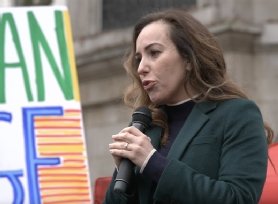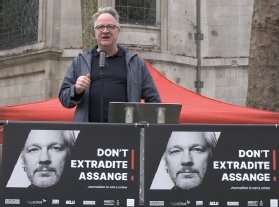
Getty Images
US extradition of Julian Assange is ‘state retaliation’ for exposing war crimes, court hears
Lawyers argue that the US extradition case against WikiLeaks founder Julian Assange is politically motivated and in is breach of the UK-US extradition treaty
The US government request to extradite WikiLeaks founder Julian Assange was “state retaliation” for exposure of classified documents that revealed alleged US war crimes, a court heard today.
Assange’s lawyers began to make his case in London’s High Court during his final bid to avoid being extradited to the US, where he faces life in prison.
The WikiLeaks founder is applying for permission to appeal against the decision of then home secretary Priti Patel to allow his extradition request.
Mark Summers KC, for Assange, argued the request by the US to extradite his client was “state retaliation” for exposure of classified documents that revealed alleged US war crimes.
“This is a prosecution for those disclosures and of those disclosures,” said Summers. “The cables subject to the various offences on this indictment disclosed extrajudicial assassinations, renditions, torture, dark prisons and rogue killings.
“The revelations brought about by the disclosure of those cables brought about a cessation of some of the practices.”
Summers said the US and the UK had “taken very different paths” since the end of the conflicts in Afghanistan and Iraq.
While the UK had shown a culture of “cooperation, of openness”, Summers argued the US had “insulated officials from the International Criminal Court, conferred immunity upon them from prosecution within the US, and classified such evidence as exists under state secrecy laws.”
Summers said unchallenged evidence of these attempts to erect impunity, attempts to use the criminal justice system to silence critics, and language by US officials suggesting they would “use any means necessary” to maintain impunity, should have been a “triple red flag” for the district judge who considered Assange’s first challenge to his extradition in 2021.
District judge Vanessa Baraitser at Westminster Magistrates Court had blocked Assange’s extradition on medical grounds – a decision which was subsequently successfully appealed against by the US government.
Summers argued Baraitser had failed to consider the political nature of the attempt to extradite Assange, which meant his extradition was barred under section 81A of the Extradition Act 2003.
He also described a “chilling” plan under former US president Donald Trump’s regime to either kidnap or assassinate Assange, which had been described in a Yahoo News article and by a witness referred to only as Witness Two.
“There is compelling evidence now in existence that the plot was real, and it is chilling,” said Summers. “There was a plot to kidnap Mr Assange, to rendition him to America or straightforwardly murder him. Senior CIA administration officials requested plans and drawings for it. The President himself requested to be provided with options as to how to do it, and sketches were even drawn up.”
Extradition treaty blocks political offences
Ed Fitzgerald KC, also for Assange, argued that the journalist’s extradition was also blocked by Article 4(1) of the US-UK Extradition Treaty.
That clause states that extradition shall not be granted if the offence for which extradition is requested is political.
“The espionage offences for which extradition is sought are – on the prosecution’s own case – political ones,” said Fitzgerald.
He argued that allowing extradition in breach of the treaty would result in detention “arbitrarily”, which would also breach Article 5 of the European Convention on Human Rights – the right to liberty and security.

The way in which WikiLeaks was described in the indictment which Assange faces – as “an intelligence agency of the people”, a “non-state, hostile intelligence service”, accused of “waging cyber war against the US” – showed these were “self-evidently” alleged political offences, Fitzgerald argued.
The WikiLeaks founder was not present in court or watching remotely due to “health reasons”, president of the King’s Bench Division Dame Victoria Sharp told the court this morning, but protests were formed outside the High Court featuring speakers such as his wife Stella and former Labour leader Jeremy Corbyn.
Assange actions not ‘routine journalism’
James Lewis KC, for the US government, in a written argument, said Assange’s argument included a “wholesale mischaracterisation” of the conduct for which he was being prosecuted.
He wrote that Assange’s case “proceeds as though the appellant is being prosecuted for mere publication, having been provided with the materials by Bradley Manning (now known, and referred to, as Chelsea Manning), as opposed to his being prosecuted for aiding and abetting, or conspiring with, Manning to unlawfully obtain them (with Manning undoubtably committing serious criminal offences in so doing) and then disclosing the unredacted names of sources (thus putting those individuals at grave risk of harm)”.
He added: “The district judge’s ruling was (unsurprisingly) an emphatic rejection of the appellant’s attempts to characterise the allegations he faces in the United States as merely routine journalism or merely assisting a whistleblower.”
Chelsea Manning’s leaks driven by conscience
Summers said US Army whistleblower Chelsea Manning had “become deeply concerned” after discovering the material she later leaked to Assange.
“Not only did she believe it to be true, it was true, and it has been acted on as such in courts around the world,” said Summers, pointing to the High Court of Pakistan as an example.
“Ms Manning’s disclosures were conscience-driven,” he added. “No harm actually has been proved to have occurred from the revelation of names in this case. There is no allegation that anyone named has actually come to harm.”
But both judges intervened to query the need for the names to have been included in the documents published by WikiLeaks, with Justice Johnson pointing out the disclosures could have happened without names of informants being disclosed.
Sharp said the leak had been described as “indiscriminate disclosures”, which had been condemned by The Guardian, The New York Times and Le Monde at the time.
Summers said the names had intended to be redacted, through a detailed process, but conceded that particular cables “had come to escape that process because of the action of one member of the team of newspapers that were involved”.
Public interest ‘eclipses all else’
Nevertheless, he suggested that even if the names of persons involved in the unlawful activities had been disclosed deliberately, the public interest in this case “eclipses all else”, and if the district judge had properly approached the balancing exercise, there was a realistic chance she would have reached that conclusion.
“The sheer enormous, unprecedented weight of the public interest in exposing ongoing war crimes, ongoing murders, renditions, torture, could outweigh the disclosure of the names of some of the people who were doing all of that,” he said.
Assange’s intention in publishing was to “encourage accountability and bring about change”, the court heard.
“The court would have regard to the sheer enormity of the sentence he faces, to the evidence in this case that he could face, on this ramped up indictment, a sentence of imprisonment that will last his natural life,” said Summers.
“And the court would have regard to the sheer chilling effect that that kind of treatment would have had on others. It is at least arguable that the result would have been different.”
Leaked documents disclosed names of informants
The US written argument said WikiLeaks published around 134,000 classified cables marked “confidential” or “secret”, which also contained names marked “strictly protect”. These sources provided information to US forces in Iraq and Afghanistan, and to US state department diplomats around the world.
“These human sources included local Afghans and Iraqis, as well as journalists, religious leaders, human rights advocates, and political dissidents from repressive regimes,” Lewis wrote.
“The United States thus devoted enormous resources to identifying people who would be at risk if and when they were outed as being sources for the United States.”
Supporters warn of impact to journalism
During the day, supporters of Assange gathered outside the court. His wife, Stella, thanked the crowd for attending.
“You are here because the world is watching. They have to know they can’t get away with this. Julian needs his freedom and we all need the truth,” she said.

Tim Dawson, deputy general secretary of the National Union of Journalists, said journalists all over the world had expressed concern about the case.
“The actions they are seeking to prosecute Julian Assange for are actions that journalists undertake every day,” he said. “He recognised that there had been wrongdoing. He found a confidential source to share the information with him and he published it to the world.
“So many famous investigative cases, the names of which we all know – thalidomide, the Panama Papers, MPs’ expenses – all came to light because whistleblowers shared confidential information.”
The case continues.






